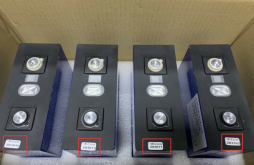I am about to order 4pcs ~280Ah cells to sweden for a van conversion. Been reading all posts here and sent a bunch of RFQs and have now nailed it down either Eve or Lishen from either Xuba or Basen. So grateful for all the support and knowledge I found in this forum!
The offers I have received incl train shipping DDP to sweden are:
Basen (Aimee Lee):
436 USD for Lishen
Xuba (Selina Li):
405 USD for Lishen and 460 USD for EVE
Basen claims they have tested each cells and guarantee they all have minimum 280Ah capacity. She sent me a picture of 4 cells with labels showing numbers in the range 283.1-283.9. Xuba responded the Lishen cells will be below 280Ah ans that I should go for eve if I want higher capacity. Xuba also said they just got 500 new eve cells.
One thing I am a little bit concerned about are the bus bar screw threads. I asked Selina at Xuba about it and she claims they are all M4. From what I understand in this forum the previous eve cells have had M6 screws? I have not yet found any clear reports about the screws on the Lishen cells. M6 would feel much better to me.
Any recommendations on what to go for? Does anyone know if Basen does some kind of capacity testing and sorting and matches cells with higher capacity and cells as 280? Or would it most likely be the same as from xuba? Any clarity on the screw sizes?
I will be super grateful for any kind of aupport from someone woth more experience.
Thank you
The offers I have received incl train shipping DDP to sweden are:
Basen (Aimee Lee):
436 USD for Lishen
Xuba (Selina Li):
405 USD for Lishen and 460 USD for EVE
Basen claims they have tested each cells and guarantee they all have minimum 280Ah capacity. She sent me a picture of 4 cells with labels showing numbers in the range 283.1-283.9. Xuba responded the Lishen cells will be below 280Ah ans that I should go for eve if I want higher capacity. Xuba also said they just got 500 new eve cells.
One thing I am a little bit concerned about are the bus bar screw threads. I asked Selina at Xuba about it and she claims they are all M4. From what I understand in this forum the previous eve cells have had M6 screws? I have not yet found any clear reports about the screws on the Lishen cells. M6 would feel much better to me.
Any recommendations on what to go for? Does anyone know if Basen does some kind of capacity testing and sorting and matches cells with higher capacity and cells as 280? Or would it most likely be the same as from xuba? Any clarity on the screw sizes?
I will be super grateful for any kind of aupport from someone woth more experience.
Thank you




